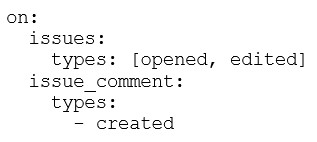At ValidExamDumps, we consistently monitor updates to the GitHub-Actions exam questions by GitHub. Whenever our team identifies changes in the exam questions,exam objectives, exam focus areas or in exam requirements, We immediately update our exam questions for both PDF and online practice exams. This commitment ensures our customers always have access to the most current and accurate questions. By preparing with these actual questions, our customers can successfully pass the GitHub Actions Certificate Exam exam on their first attempt without needing additional materials or study guides.
Other certification materials providers often include outdated or removed questions by GitHub in their GitHub-Actions exam. These outdated questions lead to customers failing their GitHub Actions Certificate Exam exam. In contrast, we ensure our questions bank includes only precise and up-to-date questions, guaranteeing their presence in your actual exam. Our main priority is your success in the GitHub-Actions exam, not profiting from selling obsolete exam questions in PDF or Online Practice Test.
Which of the following scenarios requires a developer to explicitly use the GITHUB_TOKEN or github.token secret within a workflow? (Choose two.)
Some actions may require a GITHUB_TOKEN as an input to authenticate and perform specific tasks, such as creating issues, commenting on pull requests, or interacting with the GitHub API. In such cases, you would need to explicitly pass the token to the action.
When making an authenticated GitHub API request, the GITHUB_TOKEN is required to authenticate the request. This token is automatically provided by GitHub in the workflow, and it must be explicitly used when interacting with the GitHub API.
In which locations can actions be referenced by workflows? (Choose three.)
Actions can be stored in a separate public repository and referenced in workflows by specifying the repository and action name.
Actions can also be stored in the same repository as the workflow and referenced directly by their path (e.g., ./.github/actions/my-action).
Actions can be packaged as Docker container images and published to Docker Hub. These can then be referenced in workflows by specifying the Docker image.
What is the right method to ensure users approve a workflow before the next step proceeds?
GitHub Actions allows you to configure environment protection rules, where you can require specific users or teams to approve the deployment before the workflow proceeds to the next step. This ensures that the required reviewers approve the workflow before any sensitive actions (such as deployment) occur.
You installed specific software on a Linux self-hosted runner. You have users with workflows that need to be able to select the runner based on the identified custom software. Which steps should you perform to prepare the runner and your users to run these workflows? (Choose two.)
Once the runner is properly configured and labeled, users should be informed to select the specific runner by identifying the label or group name when defining the runner in their workflows.
Adding a custom label (like custom-software) to the runner makes it easier for users to select the runner in their workflows by using the runs-on key, which allows them to choose this specific runner based on its label.
What will the output be for the following event trigger block in a workflow?

The provided event trigger block specifies two types of events:
For issues: the workflow triggers on opened or edited issues.
For issue_comment: the workflow triggers when an issue comment is created.
This configuration ensures the workflow will run when either an issue is opened or edited, or an issue comment is created.